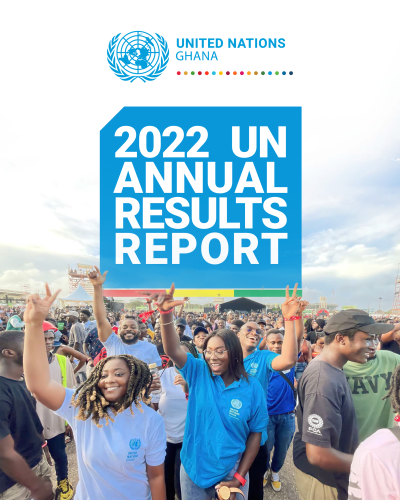UN Ghana 2022 Annual Report

The report captures the UNCT’s collective achievements along the four results areas of the UNSDP꞉ shared prosperous economy; social investment in people; protected and safe environment, and; inclusive, accountable governance, along with the UNCT’s cross-cutting priorities.
The report reflects the work done by the UNCT in partnership with the Government and people of Ghana to help the country achieve the ambitious goals set in the Coordinated Programme of Economic and Social Development Policies (CPESDP), 2017–2024, as well as to help achieve the Sustainable Development Goals (SDGs) and the African Union’s (AU) 2063 Agenda.
UN agencies, working jointly and leveraging their collective comparative advantage in various fields, have boosted Ghana’s resilience and drive towards further recovery from the impact of the COVID-19 pandemic, the knock-on effects of the war in Ukraine and climate challenges.
For instance the UNCT helped advance Ghana’s agriculture and industrial sectors by supporting policy and capacity building initiatives leading to greater agricultural productivity, the adoption of climate-action and deforestation-free production strategies, and inclusive rural development. It enabled 5,000 smallholder farmers to use improved seed, thereby cutting post-harvest losses to less than 5%, and supported agricultural-sector players’ participation in the African Continental Free Trade Area (AfCFTA). The UNCT strengthened systems to deliver quality, sustainable, and transformative social services in health, education, nutrition and social protection sectors, which helped improve services and financing. It advocated the protection of social spending, supported the continuity of essential health services and improved access for underserved and vulnerable communities. This led to a sustained decline in disease-specific and child mortality. The UNCT supported the introduction of free technical and vocational education and training (TVET), which sharply increased TVET school enrolment from 13 000 in 2021 to 47 000, among others.




















